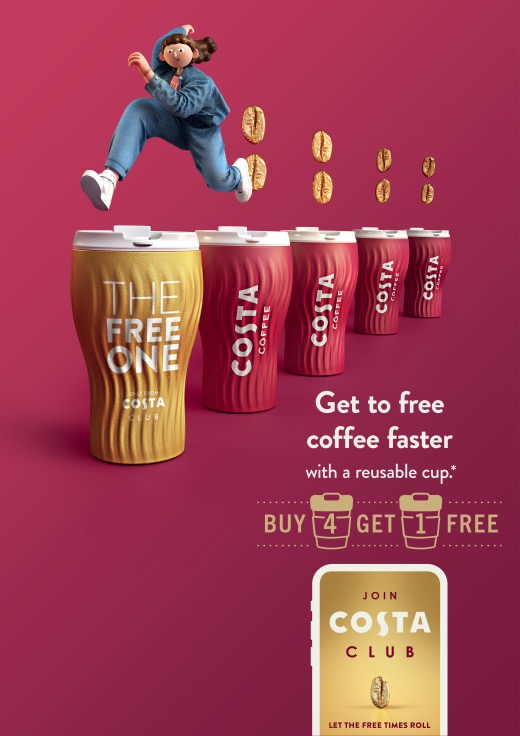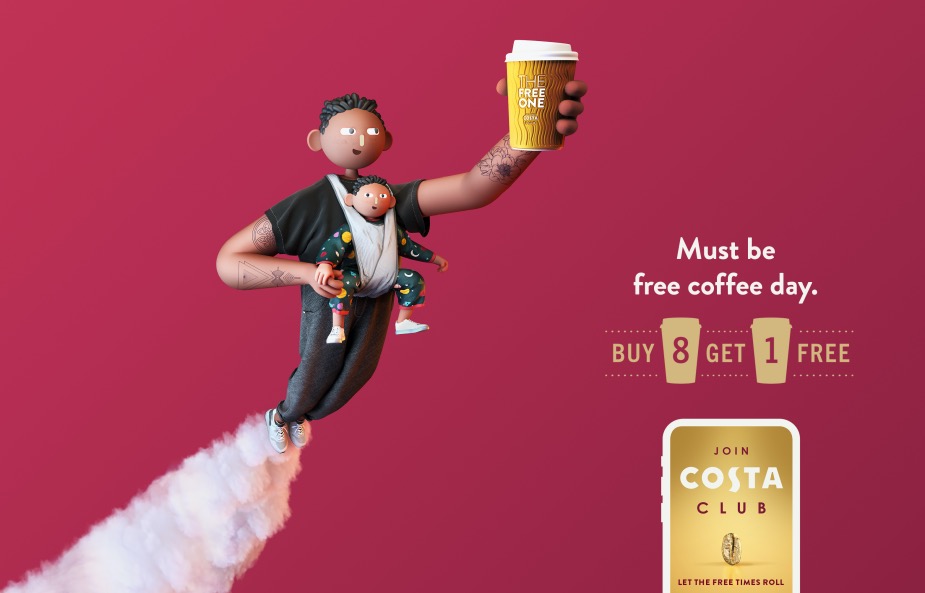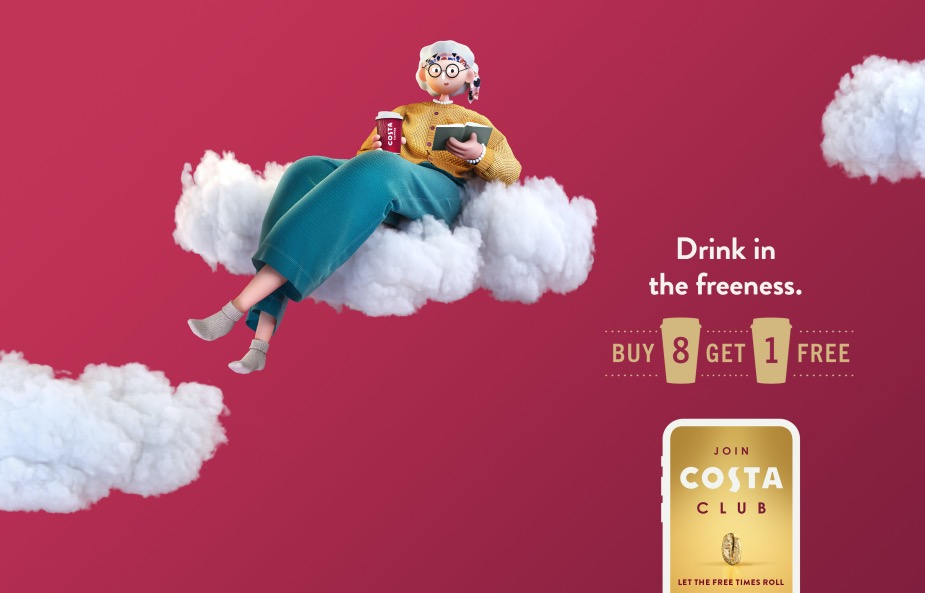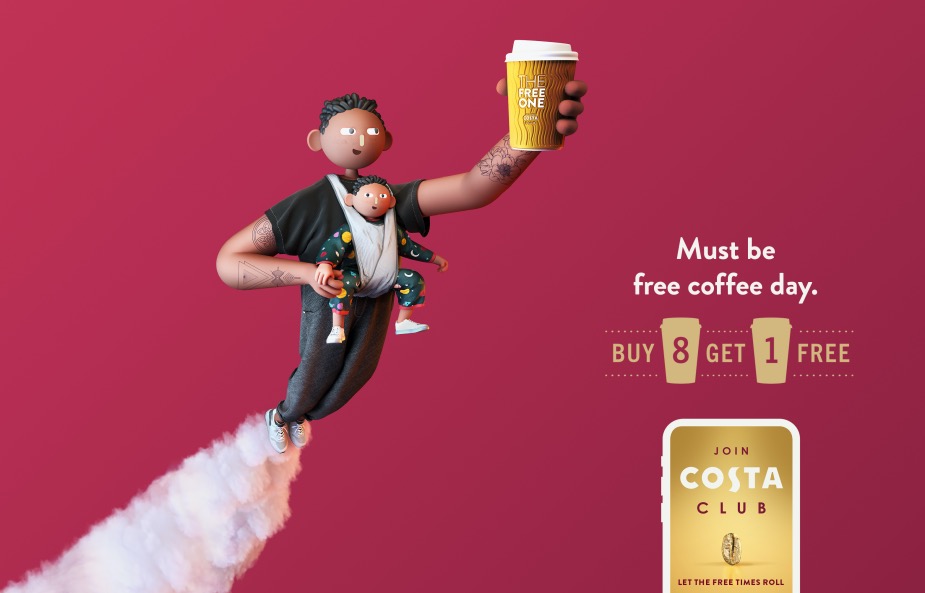
How Costa Coffee’s Brew of Loyalty and Generosity Encourages Sustainable Behaviours

The pandemic had a dramatic impact on Costa Coffee’s customer base. The caffeinated behemoth that kept the UK’s commuters going went from serving a whopping 25% of the country to 1% as the nation went into lockdown. So, the time was ripe to shake things up and in their sites was the chain’s popular loyalty programme - with six million customers it had widespread penetration - but the team felt it could be doing more for Costa Coffee drinkers.
In order to make things simpler and more effective, Costa teamed up with M&C Saatchi London to turn the Costa Coffee Club into an easy-to-understand, delightful and relevant scheme. And the team hit upon an ingenious way to fold the company’s drive to improve the sustainability of its operations into the scheme. If buying eight coffees can get you a free cup, customers using reusable coffee cups only have to buy four for the same reward.
According to Jon Fisher, head of digital UK, Costa and Annabel Mackie, managing partner, M&C Saatchi, while the revamped loyalty programme is thoroughly backed by data and accessed via a beautifully designed app, it’s ultimately driven by emotion and the principle of generosity. Since the relaunch in 2021, they’ve seen engagement with the scheme increase and redemption rates grow. They’ve also seen customers with reusable cups return to the store more frequently too, meaning they’ve helped normalise a behaviour that’s both good for the business and the planet.
LBB’s Laura Swinton caught up with Jon and Annabel to find out more about the intricacies of creating a simple loyalty experience with a surprisingly green edge.
LBB> What was the basis of Costa’s prior loyalty programme - how long had it been in action and what had it done for the business?
Jon & Annabel> Costa Coffee launched its previous loyalty scheme in March 2010. The Costa Coffee Club gave customers five points for every £1 spent in its stores, with every point being worth 1p. On top of this, bonus rewards were offered throughout the year to drive key customer behaviours.
At the time, Coffee Club was the first points-based loyalty scheme in the coffee industry. The key aim being to dominate the UK coffee market by showing coffee-lovers how much they were valued.
By the time Costa transitioned to the new scheme, Costa Coffee Club had gained six million loyalty customers, while 34% of UK sales came through Costa’s loyalty customers.
LBB> What prompted you to re-examine the loyalty strategy and see if there was something different you could do?
Jon & Annabel> Costa Coffee has played a leading role in shaping the character of the UK coffee market since 1971, capturing hearts, minds, and coffee habits, and winning ‘Nation’s Favourite Coffee Shop’ in 2021, for the twelfth consecutive year.
However, we had a fundamental challenge. The market was increasingly crowded, and the loved Costa Coffee loyalty scheme was losing relevance. Against this backdrop, our loyalty scheme, so pioneering in its day, was becoming one of the least engaging. As one tabloid liked to point out – “...a mere 27 cups of coffee needed to be bought to get one”. What’s more, qualitative research showed that our customers wanted a scheme that was simple to use and understand.
In short, we needed to relook at the value exchange we were offering our customers for their loyalty in a way that felt frictionless and easy to comprehend.
LBB> In terms of the collaboration between Costa and M&C Saatchi, what was the starting point?
Jon & Annabel> To help us reimagine the future of loyalty for Costa we went to market to find the right agency for the task. We appointed M&C Saatchi London to partner with us on this transformation plan. Their data-driven approach meant we knew creativity and commercial thinking would go hand in hand on this transformation journey, and most importantly with our customers values at the heart of the strategy.

LBB> How did you get to the idea that the loyalty programme could be used to contribute to Costa’s sustainability goals?
Jon & Annabel> Costa Coffee has long been involved in various initiatives to help reduce its environmental impact, from sustainable cup design and recycling to turning spent coffee grounds into fuel for stoves and wood burners. But these initiatives have never before formed a central part of our brand or loyalty propositions.
In recent years the need for people and businesses to be more sustainable has become an undeniable fact. So, sustainability has become a key consideration in everything we do.
What’s more, our own research showed us that incentives based around sustainability resonated with a broad and growing set of customers. It was important to us that the value exchange went beyond a transactional relationship. The sustainability initiative helps to drive this stronger emotional engagement.
Therefore, the idea that the loyalty programme could be used to achieve our sustainability goals fell into place very naturally as something that would benefit our customers, the business, and the planet. So, customers will now be able to get their free drink even faster (by buying just four drinks as opposed to eight), each time they use a reusable cup in-store.
Above and beyond our sustainability incentive, members can now receive a free drink of their choice after purchasing eight coffees. They can also choose any cake from the Costa sweet counter for free on their birthday, as well as enjoying a host of other exclusive rewards and treats. So there really is something for everyone. And it’s simple for our customers to understand.
LBB> What were the most interesting challenges that you had to overcome to bring this new programme to life?
Jon & Annabel> Firstly, as strategic development on the new loyalty programme was in full flow, we had to react to the challenges thrown up by the global pandemic. Consumer routines were fundamentally changed – at one point we went from serving 25% of the nation to less than 1%. We couldn’t just hope good numbers would return. Wwe weren’t going to short-term promote our way back to growth, we were going to focus on delighting and winning customers back for the long term. At the same time, we had to keep our eye on the ball when it came to our wider ambitions of reinventing the loyalty programme to keep up with the competition. Balancing these two interests presented a significant challenge.
By the summer of 2021, once we had completed beta testing and laid out our strategy, we were faced with the equally formidable challenge of migrating six million existing customers and 16,000 beta trial customers onto the new scheme. Because we had ensured that we were extremely thorough in the testing approach and strategic development, we had just two months to make this challenge a reality. This would mean bringing over 50 new emails into existence, with a possible 14 comms journeys for customers depending on their personal circumstances. We also had to make sure that all media channels were aligned, and that messaging was consistent throughout, while being ready and waiting with mitigation comms in case of negative feedback.
Looking back now, these considerable challenges make the implementation of Costa Club all the more rewarding.
LBB> In terms of the roll out, what have you seen in terms of the impact on customers’ behaviour?
Jon & Annabel> Following the introduction of the new Costa Club, we have seen a healthy growth in the total transactions. Significantly, transactions logged via the new Costa Club grew faster.
Where there had previously been a preference for the legacy loyalty card, following the relaunch, most Costa Club transactions were made via the app. More encouraging still, the ease and generosity meant that more members redeemed their ‘Beans’ (Costa Club’s loyalty rewards).
A significant number of transactions were from people redeeming their free coffee. In fact, we more than doubled the weekly claiming rate from a campaign we ran after the first lock-down, encouraging customers back in-store with a free coffee.
With the increased appeal of the new loyalty proposition, new registrations have grown week on week since the launch. With support from our launch campaign further accelerating sign-ups to pre-pandemic levels.
There are also good indications of the depth of engagement with the Costa Club offer. A significant portion of members are redeeming their free cake on their birthday, with most going on to buy something else or shopping again within a month. Those members using reusable cups are visiting more frequently and spending more heavily, uplifting sales penetration with sustainable cups by more than half – proof that a sustainability offering is business positive.
Overall, we can see that the increased simplicity and generosity of the revised proposition is returning a large incremental profit each month.

LBB> And since it went live, has anything surprised you about people’s response?
Jon & Annabel> We aren’t big fans of surprises. That’s why we started the process by conducting qualitative research exploring alternative propositions to the existing point-based mechanic. Included in that research was a range of 15 different value expanders. With many new members joining the Costa Club, there was a significant opportunity to unlock by identifying the right loyalty levers that would work. With multiple variables to consider, we conducted a robust conjoint study with 1,200 customers, which helped to identify the relative loyalty contribution of each individual component. Using this insight, within four months Costa Coffee created a new loyalty proposition and beta tested it with 16,000 consumers.
All of this was done to ensure that we would have as much certainty as possible that the new loyalty scheme would be well received and drive our business objectives. Consequently, there have been no major surprises that have forced us to shift direction on the core elements that make up the loyalty scheme. And many of the customer responses were things that we had already factored in and built strategies around.
LBB> As a behavioural challenge, encouraging people to carry reusable coffee cups is a big one that will need to be tackled consistently, on multiple fronts and by multiple parties. What are your thoughts about collaboration on this (whether within the sector or more broadly)?
Jon & Annabel> Firstly, we relish the challenge. We have shown that pushing a sustainability agenda can represent a win for customers, our business and ultimately the planet.
We hope that other businesses will be inspired by such actions to make changes to their own practices. As they do, we are sure that behaviours like bringing a reusable cup into the store will become the new normal. And to make this kind of change happen more quickly, we remain open-minded to the possibility of working collaboratively with businesses within our sector and beyond. At the same time, we continue to roll out other sustainable initiatives that we hope will be equally as successful.

LBB> Loyalty has a large emotional component, so aside from the reward scheme side of the programme, what do you think this new strategy for people’s emotional perceptions of the brand?
Jon & Annabel> From the outset, we built the new loyalty scheme with our customers in mind. Aside from offering great value for their loyalty, we understood that customers wanted a scheme that was simple and had moments of delight.
The central proposition is very easy to understand and engage with. In addition, the new scheme pulls upon many more emotional levers. For example, it rewards customers for positive behaviours that really make a difference (e.g. reusable cups) and celebrates moments of joy (e.g. free cake on your birthday).
Furthermore, the creative we ran brought to life the emotional joy and positive feelings experienced in the human moments that encapsulate each of the incentives. From joyfully lifting off when picking up a free coffee, to skipping over coffee beans when speeding towards a free coffee in half the time with a reusable cup. The creative execution demonstrates an understanding that loyalty programmes are not just about what you get, but, more importantly, how they make you feel.

LBB> How has this project made you rethink brand loyalty?
Jon & Annabel> The initiatives we implemented make Costa Club the most generous coffee loyalty scheme in the UK market. We grounded our strategy in the behavioural economics theory of reciprocity, which in essence says that by making a bold move and boldly giving, you are more likely to encourage customers to respond and return the favour. As evidenced by the results we are seeing so far, we have proven that generosity can be a critical investment, rather than just a cost.













